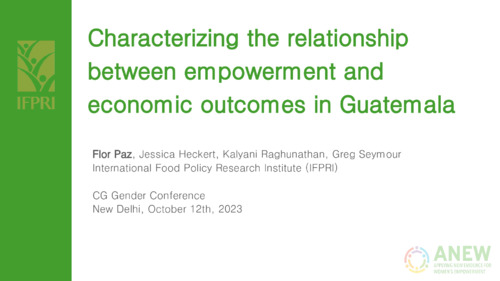Identifying pathways that affect the relationship between empowerment and economic outcomes
Abstract
Several studies have demonstrated a positive relationship between women’s empowerment and their economic outcomes, but less is known about the factors that moderate this association. Unpacking possible pathways to impact is important, especially for the design and implementation of agricultural development projects that target women or aim to improve gender-related outcomes. We use primary data on roughly 800 agricultural households in Guatemala to examine factors that could potentially moderate this relationship. We measure empowerment for a woman and man in each household using the projectlevel Women’s Empowerment in Agriculture Index for Market Inclusion. We measure household-level economic outcomes using total household income from all sources, and agricultural yield and revenues for specific crops. We identify key moderating factors of interest through a review of existing evidence and exploratory data analysis. Among others, these factors include freedom of movement, access to a safe and healthy work environment, and sound business practices—all of which have a strong theoretical or empirical connection to economic outcomes. We first use OLS regression models to study how our economic outcomes of interest are related to our measures of women’s empowerment. We then interact women’s empowerment with each of the hypothesized moderating factors to test the strength of the relationship and whether they reinforce or dampen the overall association. Our results can potentially inform the design of agricultural development projects, enabling them to better empower women farmers and enhance impacts on economic well-being.

